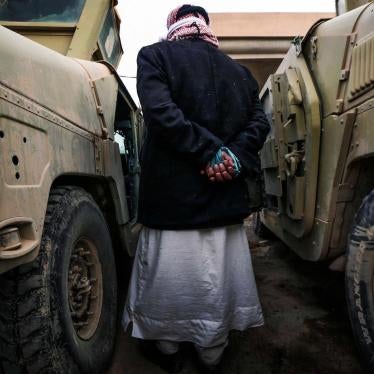(Washington, DC) - The US government should not forcibly return Guantanamo detainees to places where they fear ill-treatment without providing them a fair legal process to contest their repatriation, Human Rights Watch said today. The Obama administration today transferred Aziz Abdul Naji, an Algerian detainee, to Algeria despite his expressed fears of abuse back in the country.
"The Obama administration recognizes how essential it is to close Guantanamo by releasing detainees it has cleared," said Andrea Prasow, senior counterterrorism counsel at Human Rights Watch. "But a detainee who fears being returned home should first have a genuine opportunity to demonstrate the danger he faces."
Until now, the Obama administration has not involuntarily repatriated anyone from Guantanamo. Rather than carrying out forced returns, it has resettled detainees who fear persecution at home in safe third countries.
Aziz Abdul Naji, who has been held at Guantanamo since 2002, had told his lawyers that he did not want to return to Algeria under any circumstances because he feared persecution from the Algerian government and Islamist militants. Other Algerian detainees have also expressed fear at being forcibly returned to Algeria; one said he would rather spend the rest of his life in US custody than return to Algeria. Naji, the only Algerian transferred today, sought to bring his claim of feared ill-treatment before a court, but his request was denied by a federal judge and an appellate court. The US Supreme Court refused to stay his transfer pending further appeal.
The United States claims detainees can be returned to Algeria safely. US officials say that the country's human rights record has improved significantly over the past decade, and, in court filings in other Algerian cases, they have asserted that the Algerian government has provided so-called "diplomatic assurances" - promises to treat returned detainees humanely. Human Rights Watch's research has shown that diplomatic assurances provided by receiving countries, which are legally unenforceable, do not provide an effective safeguard against torture and ill-treatment. Algerian human rights groups report that torture and other cruel, inhuman, or degrading treatment are at times used on those suspected of terror links.
"The US has a legal obligation not to send people to countries where they face torture," Prasow said. "But it can't circumvent this obligation by relying on another country's diplomatic assurances - unenforceable promises that provide no real protection for the person returned."
During the George W. Bush presidency, Human Rights Watch documented that detainees who were returned to Russia and Tunisia suffered abuse despite diplomatic assurances from the receiving countries that they would treat the detainees humanely.
According to the Convention against Torture, which the US ratified in 1994, no one can be sent to a country where there are substantial grounds for believing that the person would be in danger of being subjected to torture or other ill-treatment. The Committee against Torture, the international expert body that monitors compliance with the Convention against Torture, said in 2006 that the United States "should always ensure that suspects have the possibility to challenge decisions of refoulement [return]."
The US government has previously resettled detainees who feared repatriation to safe third countries. These include detainees from China, Egypt, Libya, the Occupied Palestinian territories, Syria, and Tunisia.
Some 26 Algerians were originally held at Guantanamo. Prior to Naji's involuntarily return, 10 Algerians had voluntarily returned to Algeria. Most of these were held incommunicado for 12 days by the Algerian Department of Intelligence and Security (DRS), as permitted under Algerian law. None of the men reported that they were physically abused while in custody.
The government subsequently charged several of the returned men with being members of a foreign terrorist organization and tried them in criminal court. All were acquitted. One detainee, Ahmed Belbacha, who remains at Guantanamo, was tried in absentia in November 2009 and sentenced to 20 years in prison. Under Algerian law, Belbacha has the right to a new trial upon his return to Algeria. In addition to Belbacha, seven other Algerians remain at Guantanamo.
Although the Algerian detainees who were returned voluntarily to Algeria have not reported serious abuse, this should not be the basis for determining how future returnees will be treated. Some of the men who returned voluntarily were elderly, in ill health, or had wound up at Guantanamo as cases of mistaken identity. Some of the remaining detainees, though never accused of any crime, might be perceived by the Algerian government as more dangerous than those who previously returned.
"The US needs to consider the individual circumstances of each detainee before repatriation," said Prasow. "Someone who would rather remain at Guantanamo than go home should at least be given the chance to explain why in a proper legal setting."
In addition to Naji's transfer, one detainee, a citizen of Syria, was resettled over the weekend to Cape Verde. At present, 178 detainees remain at Guantanamo.






